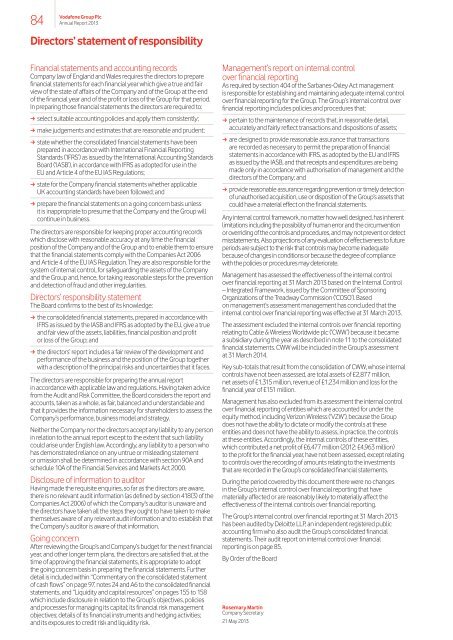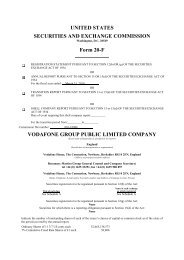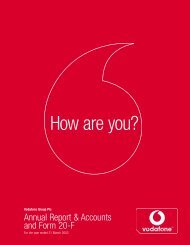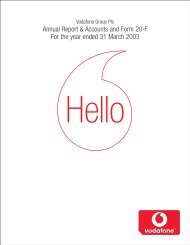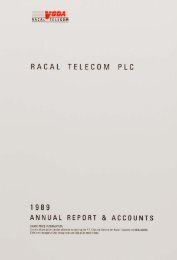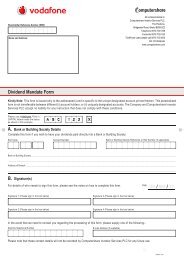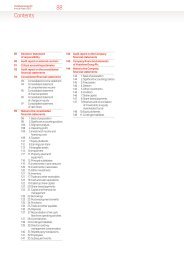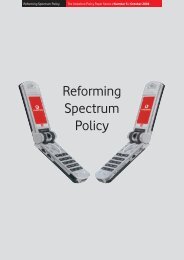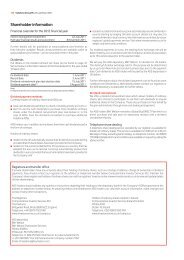The way ahead? - Vodafone
The way ahead? - Vodafone
The way ahead? - Vodafone
Create successful ePaper yourself
Turn your PDF publications into a flip-book with our unique Google optimized e-Paper software.
84<br />
<strong>Vodafone</strong> Group Plc<br />
Annual Report 2013<br />
Directors’ statement of responsibility<br />
Financial statements and accounting records<br />
Company law of England and Wales requires the directors to prepare<br />
financial statements for each financial year which give a true and fair<br />
view of the state of affairs of the Company and of the Group at the end<br />
of the financial year and of the profit or loss of the Group for that period.<br />
In preparing those financial statements the directors are required to:<br />
a select suitable accounting policies and apply them consistently;<br />
a make judgements and estimates that are reasonable and prudent;<br />
a state whether the consolidated financial statements have been<br />
prepared in accordance with International Financial Reporting<br />
Standards (‘IFRS’) as issued by the International Accounting Standards<br />
Board (‘IASB’), in accordance with IFRS as adopted for use in the<br />
EU and Article 4 of the EU IAS Regulations;<br />
a state for the Company financial statements whether applicable<br />
UK accounting standards have been followed; and<br />
a prepare the financial statements on a going concern basis unless<br />
it is inappropriate to presume that the Company and the Group will<br />
continue in business.<br />
<strong>The</strong> directors are responsible for keeping proper accounting records<br />
which disclose with reasonable accuracy at any time the financial<br />
position of the Company and of the Group and to enable them to ensure<br />
that the financial statements comply with the Companies Act 2006<br />
and Article 4 of the EU IAS Regulation. <strong>The</strong>y are also responsible for the<br />
system of internal control, for safeguarding the assets of the Company<br />
and the Group and, hence, for taking reasonable steps for the prevention<br />
and detection of fraud and other irregularities.<br />
Directors’ responsibility statement<br />
<strong>The</strong> Board confirms to the best of its knowledge:<br />
a the consolidated financial statements, prepared in accordance with<br />
IFRS as issued by the IASB and IFRS as adopted by the EU, give a true<br />
and fair view of the assets, liabilities, financial position and profit<br />
or loss of the Group; and<br />
a the directors’ report includes a fair review of the development and<br />
performance of the business and the position of the Group together<br />
with a description of the principal risks and uncertainties that it faces.<br />
<strong>The</strong> directors are responsible for preparing the annual report<br />
in accordance with applicable law and regulations. Having taken advice<br />
from the Audit and Risk Committee, the Board considers the report and<br />
accounts, taken as a whole, as fair, balanced and understandable and<br />
that it provides the information necessary for shareholders to assess the<br />
Company’s performance, business model and strategy.<br />
Neither the Company nor the directors accept any liability to any person<br />
in relation to the annual report except to the extent that such liability<br />
could arise under English law. Accordingly, any liability to a person who<br />
has demonstrated reliance on any untrue or misleading statement<br />
or omission shall be determined in accordance with section 90A and<br />
schedule 10A of the Financial Services and Markets Act 2000.<br />
Disclosure of information to auditor<br />
Having made the requisite enquiries, so far as the directors are aware,<br />
there is no relevant audit information (as defined by section 418(3) of the<br />
Companies Act 2006) of which the Company’s auditor is unaware and<br />
the directors have taken all the steps they ought to have taken to make<br />
themselves aware of any relevant audit information and to establish that<br />
the Company’s auditor is aware of that information.<br />
Going concern<br />
After reviewing the Group’s and Company’s budget for the next financial<br />
year, and other longer term plans, the directors are satisfied that, at the<br />
time of approving the financial statements, it is appropriate to adopt<br />
the going concern basis in preparing the financial statements. Further<br />
detail is included within “Commentary on the consolidated statement<br />
of cash flows” on page 97, notes 24 and A6 to the consolidated financial<br />
statements, and “Liquidity and capital resources” on pages 155 to 158<br />
which include disclosure in relation to the Group’s objectives, policies<br />
and processes for managing its capital; its financial risk management<br />
objectives; details of its financial instruments and hedging activities;<br />
and its exposures to credit risk and liquidity risk.<br />
Management’s report on internal control<br />
over financial reporting<br />
As required by section 404 of the Sarbanes-Oxley Act management<br />
is responsible for establishing and maintaining adequate internal control<br />
over financial reporting for the Group. <strong>The</strong> Group’s internal control over<br />
financial reporting includes policies and procedures that:<br />
a pertain to the maintenance of records that, in reasonable detail,<br />
accurately and fairly reflect transactions and dispositions of assets;<br />
a are designed to provide reasonable assurance that transactions<br />
are recorded as necessary to permit the preparation of financial<br />
statements in accordance with IFRS, as adopted by the EU and IFRS<br />
as issued by the IASB, and that receipts and expenditures are being<br />
made only in accordance with authorisation of management and the<br />
directors of the Company; and<br />
a provide reasonable assurance regarding prevention or timely detection<br />
of unauthorised acquisition, use or disposition of the Group’s assets that<br />
could have a material effect on the financial statements.<br />
Any internal control framework, no matter how well designed, has inherent<br />
limitations including the possibility of human error and the circumvention<br />
or overriding of the controls and procedures, and may not prevent or detect<br />
misstatements. Also projections of any evaluation of effectiveness to future<br />
periods are subject to the risk that controls may become inadequate<br />
because of changes in conditions or because the degree of compliance<br />
with the policies or procedures may deteriorate.<br />
Management has assessed the effectiveness of the internal control<br />
over financial reporting at 31 March 2013 based on the Internal Control<br />
– Integrated Framework, issued by the Committee of Sponsoring<br />
Organizations of the Tread<strong>way</strong> Commission (‘COSO’). Based<br />
on management’s assessment management has concluded that the<br />
internal control over financial reporting was effective at 31 March 2013.<br />
<strong>The</strong> assessment excluded the internal controls over financial reporting<br />
relating to Cable & Wireless Worldwide plc (‘CWW’) because it became<br />
a subsidiary during the year as described in note 11 to the consolidated<br />
financial statements. CWW will be included in the Group’s assessment<br />
at 31 March 2014.<br />
Key sub-totals that result from the consolidation of CWW, whose internal<br />
controls have not been assessed, are total assets of £2,877 million,<br />
net assets of £1,315 million, revenue of £1,234 million and loss for the<br />
financial year of £151 million.<br />
Management has also excluded from its assessment the internal control<br />
over financial reporting of entities which are accounted for under the<br />
equity method, including Verizon Wireless (‘VZW’), because the Group<br />
does not have the ability to dictate or modify the controls at these<br />
entities and does not have the ability to assess, in practice, the controls<br />
at these entities. Accordingly, the internal controls of these entities,<br />
which contributed a net profit of £6,477 million (2012: £4,963 million)<br />
to the profit for the financial year, have not been assessed, except relating<br />
to controls over the recording of amounts relating to the investments<br />
that are recorded in the Group’s consolidated financial statements.<br />
During the period covered by this document there were no changes<br />
in the Group’s internal control over financial reporting that have<br />
materially affected or are reasonably likely to materially affect the<br />
effectiveness of the internal controls over financial reporting.<br />
<strong>The</strong> Group’s internal control over financial reporting at 31 March 2013<br />
has been audited by Deloitte LLP, an independent registered public<br />
accounting firm who also audit the Group’s consolidated financial<br />
statements. <strong>The</strong>ir audit report on internal control over financial<br />
reporting is on page 85.<br />
By Order of the Board<br />
Rosemary Martin<br />
Company Secretary<br />
21 May 2013


